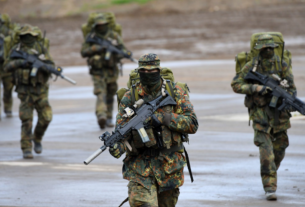The chief minister of India’s Manipur state, N. Biren Singh, resigned after months of deadly violence. Ethnic clashes between the Meitei and Kuki communities have left hundreds dead and thousands displaced.
“I have decided to step down in the interest of peace,” Singh stated in his resignation. His decision followed harsh criticism of the government’s failure to control the violence.
The violence began after a court ruling granted tribal status to the Meitei community. This decision sparked protests and violent clashes, leading to widespread destruction in the state.
Armed groups from both sides attacked villages, burning homes and killing civilians. The violence has severely disrupted daily life and left many without shelter or basic necessities.
The Indian army has been deployed to restore order, but clashes continue. Some residents accuse the authorities of favoring the Meitei community, worsening tensions.
Human rights organizations report thousands of displaced people living in overcrowded relief camps. Many of these camps lack adequate food, water, and healthcare for the survivors.
As a result of the violence, Manipur’s economy has suffered significant losses. Businesses have been destroyed, and the agricultural sector has been crippled due to abandoned farmlands.
Survivors demand justice for those killed in the violence and protection from further attacks. They have called on both local and central governments to take immediate action.
The central government has promised steps to stabilize the situation and address the root causes of the conflict. A new chief minister will soon take office, but the effectiveness of these changes remains uncertain.
Political leaders are under pressure to find solutions that will restore peace. The violence has created deep mistrust between the Meitei and Kuki communities, making reconciliation difficult.
In the meantime, the displaced population continues to suffer in the relief camps. Many survivors face dire living conditions and struggle to rebuild their lives after losing their homes and livelihoods.
The military’s presence in the region has not been enough to stop the ongoing violence. While some areas have seen temporary calm, attacks have resumed in others.
The resignation of the chief minister marks a critical moment in the crisis, but the path to peace is unclear. The government must address the grievances of both communities to prevent further bloodshed.
International human rights groups have called for an investigation into alleged abuses during the conflict. Survivors are demanding accountability for those responsible for the violence.
Manipur’s infrastructure, already fragile, has been severely damaged. The state faces a long recovery process, with rebuilding efforts depending on the resolution of the conflict.
Despite the challenges, some political leaders are pushing for a peace agreement between the Meitei and Kuki. Talks aimed at ending the violence have been slow, but some progress has been made.
The people of Manipur are anxious for a resolution that will end the bloodshed. Many fear that without meaningful action, the violence will continue to escalate.
The resignation of the chief minister does not guarantee an immediate end to the conflict. The central government will need to work closely with local leaders to find lasting solutions.
The situation in Manipur remains tense, with no clear end in sight. As the government prepares for the new leadership, the focus must be on ensuring security for all communities.




